A MusicWeb
Survey of Our Favorite Neglected Recordings
Edited
by Mike Parr
In
April of 2020 at the height of the Coronavirus pandemic, physical
isolation was keeping us all inside our residences. The idea was born
to survey our reviewers about their favorite neglected recordings.
My colleagues enthusiastically wrote in with their suggestions to
be shared with our MusicWeb readers. Among the list of recordings
you will find some that have never been released in any digital format.
There are some recordings that have been overlooked or not well liked
by critics but that we feel deserve more attention than they have
received. In some cases the original label has ceased operations and
the continued existence of the master tapes is questionable. In each
entry you will find my note at the end of the listing indicating the
current status of the release.
About Sound Formats
For
many of these recordings the CDs are no longer available, although
used copies are listed on Amazon and other commercial sites. Most
of them are available for streaming via a web music service. The Naxos
streaming service seems to have the most complete classical catalogue
of all of the companies that are out there. I have not been able to
look extensively into I-tunes, Spotify, or E-Music. They may have
albums available that Naxos doesn’t. For digital downloads the Presto
Classical website seems to have the most extensive catalogue for purchasing
both MP3 and the higher resolution FLAC files. These FLAC files can
be played directly according to your equipment’s capabilities or they
can be converted into CDs with virtually no loss of data. Some labels
are now offering very High Resolution FLAC files at 96 kHz or 192 kHz for an experience
that is pretty much what the musicians experienced in the recording
studio. These files must be played using a USB compatible component.
I recently purchased Leonard Bernstein’s 1965 recording for Sony/CBS
of Haydn’s Creation at 192 kHz. I can happily report that the
sound was quite a revelation and truly worth the purchase. It is important
to note when using a web streaming service or purchasing digital downloads
that the music labels and the performers are receiving the royalties
that they are entitled to. In very rare cases where the recordings
are no longer available in any format and the label is defunct I was
able to locate a few of them which someone has uploaded on You Tube.
I have provided links to these so that you can hear them if you wish.
It
is the earnest hope of all of us that the recording companies will
dust off the masters of the albums we suggest here and make them available
again on CD, MP3, FLAC, and streaming formats to music lovers around
the world to enjoy once more.
Mike
Parr
Stephen Barber
 César
FRANCK (1822-1890)
César
FRANCK (1822-1890)
String Quartet in D major (1889) [47:44]
Violin Sonata in A major (1886) [29:35]
Fitzwilliam Quartet: (Christopher Rowland, Jonathan Sparey (violins); Alan George (viola); Ioan
Davies (cello)); Pierre Amoyal (violin);
Pascal Rogé (piano)
rec.
The Maltings Concert Hall, Snape, October 1978 (Quartet) ADD; Barbirolli
Hall, Chorleywood, May 1994 (Sonata)
DECCA
ELOQUENCE 476 8463 CD [77:23]
The
Franck string quartet is a desert island work for me and this is one
of the best recordings of it. Along with their Shostakovich cycle,
it is the finest achievement of the original Fitzwilliam quartet.
The sonata is a suitable coupling, but it is the quartet which makes
this so special.
Read William Kreindler’s MusicWeb
review here
 Igor
STRAVINSKY (1882-1971)
Igor
STRAVINSKY (1882-1971)
Concerto in E flat ‘Dumbarton Oaks’; Concerto in D for strings; Danses
Concertantes; Cantata on Old English texts
Patricia Kern, (mezzo-soprano); Alexander Young (tenor);
The St Anthony Singers; English Chamber Orchestra/Colin Davis
Recorded 1962
Decca
425 622-2 CD [71:07]
Colin
Davis had a real flair for Stravinsky’s neoclassical period, as is
shown by his classic recording of Oedipus Rex. Here we have
wonderfully crisp and biting performances of the three concerto grosso-style
works, together with a really haunting and powerful one of the strange
introverted Cantata, obviously suggested by the example of Britten’s
Serenade. It’s a shame that this has not been reissued more recently.
Editor’s Note: This CD is currently unavailable.
It is available for streaming via the Naxos website.
 William
MATHIAS (1934-1992)
William
MATHIAS (1934-1992)
Symphony No. 3; Helios; Requiescat; Oboe
Concerto
David Cowley (oboe), BBC Welsh Symphony Orchestra/Grant Llewellyn
rec. Brangwyn Hall, Swansea, 11 November 1991; 11 February 1992
Nimbus
CD NI 5343 [72:22]
I was astonished when I first heard the symphony here and immediately
considered it a masterpiece. I am amazed it hasn’t had many more performances.
Those who like the symphonies of Rawsthorne or Tippett would enjoy
it. It has driving rhythms, memorable themes and is very exciting.
While the other pieces are good, the symphony is arguably Mathias’
masterpiece.
Read Rob Barnett’s MusicWeb
review here
Editor’s Note: This CD remains available. It is also available for digital download
and for streaming via the Naxos site.

Igor
STRAVINSKY (1882-1971)
Les
noces (1917 and 1919 versions);
Chant du Rossignol;
Symphonies of wind instruments (1947 version)
Gregg Smith Singers, Orpheus Chamber Ensemble (Les noces), Columbia Symphony Orchestra (other works) cond. Robert
Craft
Recorded 1974
Sony
8887502616 [60:00]
Les
noces had a
long and complicated gestation, in the course of which Stravinsky
tried out different instrumentations. The 1917 version uses a chamber
ensemble; the 1919 one, of which only two scenes were completed, experimented
with a strange ensemble including two cimbalons
and a pianola. Although there have been
other recordings of these versions, this one by Craft, coupling the
two, has its own authority.
Editor’s Note: This is currently only available
in the 56-CD Igor
Stravinsky: The Complete Album Collection; it has never been issued
as a single CD.
Nick
Barnard
 Lili
BOULANGER ( 1893-1918)
Lili
BOULANGER ( 1893-1918)
Faust
et Hélène (1913);
Pour les funerailles d'un soldat
(1912-13)
André Mallabrera (tenor); Lyne Dourian
(mezzo)
Choeur et L'Orchestre
National de l'Opéra de Monte Carlo/Igor Markevitch
Released
1977, recording date unknown
FESTIVAL
C LP FC 441 [36:20]
Igor
Markevitch conducting L'Orchestre National de l'Opera
de Monte Carlo in Faust et Hélène. This is by
far the best performance of this great piece I have heard. The
recording is murky and the orchestra distinctly fallible BUT Markevitch
has a real feel for Boulanger's music and the role of Faust is sung
by Andre Mallabrera to golden-voiced perfection.
Helene, sung by Lyne Dourian, is less of a joy!
Editor’s
Note: While this performance is not available on CD, Digital
Download or via steaming services, those who are curious to investigate
Faust et Hélène from this LP can find it on
You Tube here. There are no links
currently available for Pour les funerailles
d'un soldat.
 Jacques
IBERT ( 1890 – 1962)
Jacques
IBERT ( 1890 – 1962)
Divertissement (1930)
Leonard
SALZEDO (1921 – 2000)
The Witch Boy ballet 1956 [19:58]
London
Philharmonic Orchestra/Leonard Salzedo
Released
in 1971, rec. date unknown
CLASSICS
FOR PLEASURE LP CFP 179
One
half of an old CFP LP. Salzedo has been very under-represented
in the catalogue - just a couple of discs of string quartets.
The Witch Boy is a greatly enjoyable ballet suite, played
with real energy by the LPO under the conductor's baton. The
coupling of the Ibert Divertissement
is less 'rare' but this performance was unusual at the time for being
played by a very small/theatre ensemble and is another cracking performance.
Generally, I'd love to hear more Salzedo!
Editor’s Note: While this performance is
not available on CD, Digital Download or via steaming services, those
who are curious to investigate The Witch Boy from this LP
can find it on You Tube here. There are no links
currently available for Divertissement.
Rob Barnett
 Sir
Edward ELGAR (1857-1934)
Sir
Edward ELGAR (1857-1934)
Piano
Concerto (unfinished-sketches, drafts and recordings of his Piano
Concerto realised for performance by Robert Walker)
Suite
of Four Edward Elgar Songs (transcribed for orchestra by Haydn Wood
So Many True Princesses (orch: Anthony Payne) (1932)
Spanish Serenade, op. 23 (1892)
The Immortal Legions (from ‘Pageant of Empire’) (1924)
Anthony
COLLINS (1893-1963)
Elegy in Memory of Edward Elgar
David
Owen Norris (piano);
BBC
Singers; BBC Concert Orchestra/David Lloyd-Jones
Recorded:
Studio 1, Abbey Road, London, 18 and 19 October 2004.
DUTTON
EPOCH CDLX 7148 [74:40]
The
ravishingly lilting and indelibly memorable Spanish Serenade is
the choice item here. The tambourine provides exotic atmosphere in
this truly lovely troubadour song. It is a perfect piece which, incongruously
for its Iberian claims, taps into the perpetual Nordic summer-nights
and Brahms’ vocal ensemble Volkslieder; all done with Mendelssohnian
delicacy. It would be a natural for repeat playings on Classic FM.
Read
Rob Barnett’s MusicWeb
review here.
Editor’s Note: This CD is no longer available but it is available
as a digital download via I-Tunes.
 Janis
IVANOVS (1906-1983)
Janis
IVANOVS (1906-1983)
Violin
Concerto (1951)
on
Baltic Violin Concertos: by Ivanovs, Sibelius
and Sallinen Valdis Zarins (Violin); Latvian National Symphony Orchestra /Vassily Sinaisky
CAMPION
CAMEO - CAMEO CD 2004
This
romantic virtuoso concerto is written in language everyone will recognise.
The impact of this music is immediate and winning. The first movement
drives forward with a busy moto perpetuo figure with a Sibelian
accent. I defy you not to smile as the solo violin takes to flight
again at 11:00. The second movement is the gem of the whole work.
The movement ends with the violin high in the stratosphere. In the
final movement, the violin is soon in full flight.
Read
Rob Barnett’s MusicWeb
review here.
Editor’s Note: This CD is currently still
available.
Lee Denham
 Richard STRAUSS (1864-1945)
Richard STRAUSS (1864-1945)
Till Eulenspiegels lustige
Streiche, Op.28 [15.04]
Philharmonia Orchestra/Otto Klemperer
rec. Kingsway Hall, London, February-March 1960
EMI CLASSICS 2484682 (now Warner Classics)
I'm not sure if the name Otto Klemperer is necessarily
one I'd first associate with Richard Strauss - however once again
I was proved wrong with this disc, tucked away amongst several others
of more obvious Klemperer territory of bleeding chunks of
Wagnerian operas (review). However, I've listened to the Richard Strauss disc several times now
- a bit of a mixed bag, I have to say. Don Juan opens
the disc and lumbers in with all the testosterone of a lothario in
an electric mobility scooter; disappointing. Salomé's Dance of
the Seven Veils starts in similar fashion, but actually gets considerably
better as it progresses. Likewise, I wouldn't have thought Tod
und Verklärung would be Klemp's
cup of tea, but he makes a good job of it, especially the section
immediately after the "death" with textures nicely clarified,
where others sound muddy. The final climax, taken a little faster
than usual, was magnificent in its grandeur as well - I was impressed,
although not enough for it to displace Szell/Cleveland on CBS Sony
or Karajan/BPO (DG Dig) at the top of my list. Even more surprising
was Till Eulenspiegel - here the Philharmonia woodwind section
has a riotous time, sardonic and sarcastic with Klemperer revealing
a gruff humour. Till isn't my favourite Strauss work, but with Klemperer
conducting it is probably up there with Solti/Chicago as my preferred
versions. How it always gets overlooked just leaves me dumbfounded!
Read Paul Corfield Godfrey’s MusicWeb review here of the 5-disc set.
Editor’s
note: The Strauss work remains available as part of a 5-disc anthology of Klemperer’s
Wagner and Strauss recordings. It is also available for digital download
and streaming from the Naxos site.

Ludwig van BEETHOVEN (1770-1827)
Symphony No. 5 in C minor, Op. 67 [23:30]
Orchestre Lamoureux/Igor Markevitch
rec. 1959 Paris
DECCA 464 090 2 & DG 4988005700858
In honour of Beethoven’s special year, I nominate
this little-remembered recording of the iconic Fifth Symphony, originally
issued on a single LP on Philips with the Eighth, then as part of
a set of other Beethoven symphonies and overtures on DG and now
on Decca CD (here). I first discovered it on YouTube when someone decided it was THE reference recording! Really? Not Kleiber's,
Furtwängler's, Karajan's or the other usual
suspects? A recording from a little-known Parisian orchestra under
a Russian conductor, shorn of all its repeats in 1950's sound?! Well,
no - the orchestra is not quite the Berlin or Vienna Philharmonic.
Nor will you find anything especially historically-informed here either. Instead, if
it is a shot of white-hot Beethoven in the arm to knock your senses
sideways that you need, then look further. Of course, one man's reference
is another's rubbish - but I for one am very glad I stumbled across
Markevitch's recording of the C Minor
in the most unlikely of circumstances. Well worth you tracking
it down.
Editor’s Note: This has been available as a single on Decca and as part of a 4-disc
set on DG. Neither release is currently in the catalogue.
Paul Corfield Godfrey
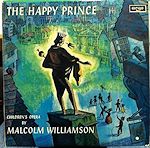 Malcolm
WILLIAMSON
Malcolm
WILLIAMSON
The Happy Prince (1965)
Pauline Stevens; April Cantelo; Sheila Rex; Maureen Lehane; Guildhall
Chamber Choir; ensemble/Marcus Dods
ARGO ZNF 5 [LP, 1965]
This one-act 'children's opera' must stand as one of the best settings
of Oscar Wilde in the operatic repertory, and I have for years now
been taking every available opportunity to lament the fact that the
original LP recording has never made it onto CD. The end of the opera,
skirting sentimentality by the skin of its teeth, is one of the most
moving conclusions to any British stage work written in the twentieth
century; and it is well served here by a cast of adult singers who
can invest Wilde's text with all the feeling it demands. Pauline Stevens
in particular is heart-breaking as the statue who comes to realise
the weight of the world's misery, and the fact that the work was dedicated
to her gives this recording an additional historical importance. The
instrumental ensemble includes the composer and Richard Rodney Bennett
on piano duet, with Neville Marriner as lead violin.
And while we're at it, how about a release of Williamson's other
'children's opera' Julius Caesar Jones written a year later and released
by Argo at around the same time and featuring some of the same performers?
Amazon offer one solitary second-hand vinyl copy of The Happy Prince
at a price of £36. There were at the time of writing no available
copies of Julius Caesar Jones at all.
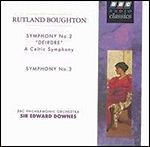 Rutland
BOUGHTON
Rutland
BOUGHTON
Symphony No 2 (1927) Deirdre
Symphony No 3 (1939)
BBC Philharmonic Orchestra/Sir Edward Downes
BBC RADIO CLASSICS 15656 9189-2 [CD, 1997]
Boughton's second symphony was unpublished when Downes gave this
performance in the 1980s, but its Celtic atmosphere and subject place
the score in the same class as Brian's Sixth Symphony (also based
on the same legend). For this commercial CD release BBC Radio Classics
very sensibly coupled the recording with Downes's version of the Elgarian
Third Symphony, which with its sense of romantic ardour makes a stronger
impression here than in the rival Hyperion disc conducted by Vernon
Handley. The CD survived in the catalogue for a very short time, not
long enough to establish itself; and this remains the solitary recording
that Deirdre has ever received. It should be revived. And now that
Stanford's operas are finally making a comeback, what about the many
totally neglected works of Boughton in the same vein, beginning with
Alcestis and moving on to the King Arthur cycle?
And also while we're at it, the BBC also need to resurrect Downes's
coupling of two of the Bax Northern Ballads, briefly available on
BBC Radio Classics and also recorded with the BBC Philharmonic, in
performances that challenge all rivals, coupled with Tintagel and
Bantock's Pagan Symphony. Better still, they should add the first
of the Northern Ballads (given at the same concert) to complete the
set.
Amazon list available copies of the Bax disc at reasonable prices,
but the Boughton symphonies are unavailable at rates below £21
- around three times the new price when originally released.
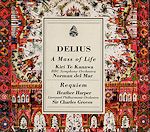 Frederick
DELIUS
Frederick
DELIUS
A Mass of Life (1908)
Kiri te Kanawa; Pamela Bowden; Ronald Dowd; John Shirley-Quirk; BBC
Chorus, Choral Society and Symphony Orchestra/Norman del Mar
INTAGLIO INCD 702 [2 CDs, 1992]
This recording derives from a live 1971 BBC broadcast; it was issued
as part of the first batch of CD recordings on the Intaglio label,
but disappeared after only a few months presumably because of copyright
reasons. In terms of sound it roundly trounces Beecham's 1953 recording,
and in terms of performance it stands comparison with its successors.
Norman del Mar conducts a reading of transcendent passion, John Shirley-Quirk
is ideal as Zarathustra, and the young Kiri te Kanawa crowns the ensemble
magnificently. Someone needs to get their hands on the tape, clear
up the copyright issues, and reissue the recording. (They need not
trouble themselves unduly about the coupled Delius Requiem, conducted
by Groves in Liverpool; Heather Harper is very good but to be heard
in the same part to better advantage elsewhere, while Thomas Hemsley's
dry tone is done no favours by close microphone observation.)
And again while we're at it, what has happened to Norman del Mar's
other Delius recordings in the shape of his unique accounts of the
operas Irmelin and The Magic Fountain, once available on CD sets from
BBC Artium but long vanished?
Amazon show quite a few copies of the Mass of Life left in stock
at around double its original price; but second-hand copies of the
operas (where there are no alternatives recordings) are priced at
figures ranging up to an eye-watering £195.
Stephen Greenbank

Johan Sebastian BACH (1685-1750)
Sonatas & Partitas for Solo Violin
Masuko Ushioda (violin)
(EMI) Catalogue
number unavailable
Masuko Ushioda recorded the cycle twice. The one that I'm
interested in was recorded in 1971-2 and is her first traversal. It
was difficult and extremely expensive to obtain in the UK. She later
recorded a cycle in the 1990s - on the Fontec
label. I once had the opportunity to hear it, and very fine it is. Ushioda commands beauty of tone, flawless technique and immaculate
intonation. She has an intelligent grasp of the architecture and structure
of these works and her clarity of contrapuntal strands in the fugues
is impressive. The recording was made in an agreeable acoustic - I
don't know where - and has a warmth
and intimacy with just the right degree of reverberation.
Editor’s Note: I have been unable to locate any further information on this recording
other than the item number for Amazon. I was not able to track down
a catalogue number for the disc.
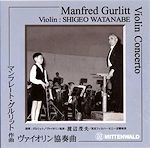 Manfred
GURLITT (1890-1972)
Manfred
GURLITT (1890-1972)
Violin Concerto in F major
Shigeo Watanabe (violin)
Tokyo Philharmonic Orchestra/ Manfred Gurlitt
rec. 11 February1955, Hibiya Public Hall, Tokyo
World Premiere Recording
Mono
MITTENWALD MTWD 99025 [37:21]
Shigeo Watanabe (1941-1999) made his Japanese debut aged seven in
1948. In 1954, Jascha Heifetz who was visiting Japan, heard the young
violinist and was very impressed. He arranged for him to study with
Ivan Galamian at the Julliard School of Music, New York City. The
whole thing had disastrous consequences. He couldn't speak English
and found himself ostracized. He returned to Japan, became ill and
never played the violin again. He made a number of fine recordings
as a teenager in the early 1950s. I've collected several over the
years. He commanded a near-perfect technique, fabulous tone and maturity
of expression.
This is a live concert recording on the obscure Japanese Mittenwald
label. Available on Amazon
but expensive when you add on import duty. I managed to hear it on
Youtube several years ago, but it has since been removed.
Michael
Greenhalgh

Ludwig van BEETHOVEN (1770-1827)
Symphony No. 5 in C minor, op. 67 (1808) [27:14]
Symphony No. 6 in F major, op. 68 Pastoral (1808) [33:38]
Royal Philharmonic Orchestra/Felix Weingartner
rec. 18-19 January 1927 (op. 68), 28-29 January 1927 (op. 67), Scala
Theatre, London.
The Columbia Beethoven Centennial Series – Volume 3
PRISTINE AUDIO PASC399 [60:55]
Why
bother about a 1927 recording of the ‘Pastoral’, which is a standard
work? Because something about the atmosphere and direction and the
sheer joy in the playing this creates will illuminate your appreciation
of the work. Having a small body of strings aids the transparency
of the orchestration. Everything is finely balanced: high points are
clear but nothing is overstated, yet the full arrival of the storm
is still a shock. Weingartner manages to
be both relaxed, where needed, and seamless in progression so you
do feel you have experienced the wood as well as the clear detail
of the trees. Of course, for fuller sonority you need more modern
recordings, but they might not give you as rounded satisfaction.
Read
Michael Greenhalgh’s MusicWeb
review here.
Editor’s
Note: Currently this is available on CD and for digital download in
multiple formats via the Pristine Audio website here.

Franz SCHUBERT (1797-1828)
String Quartet No, 14 in D minor, D810, "Death and the Maiden"
(1824) [43:41]
Pyotr Il’yich TCHAIKOVSKY (1840-1893)
String Quartet No. 3 in E flat minor, op. 30 (1876) [38:25]
Kopelman Quartet
rec. live, 25 August 2003, Queen’s Hall, Edinburgh, Edinburgh Festival,
DDD
NIMBUS NI5962 [43:41 + 38:25]
Why
bother about a concert recording of a standard work? The BBC one here
is OK, but I’m sure I could get more vivid sound and sometimes more
beautiful, or maybe slick, playing in a studio account. What comes
here is far more valuable: real tension, immediacy, emotion. You can’t
fake these: they are either there in the spontaneity of the performance
or embarrassing in their contrived nature. Not here. There’s a roller-coaster
feel as you get caught up in the range of emotions: awe, longing,
desolation, contentment, despair all there. And you share these with
the players.
Read Michael Greenhalgh’s MusicWeb review here.
Editor’s Note: These CD’s are currently still available. They are
also available as digital downloads and streaming from the Naxos site.
Gary Higginson

French Court Music of the 13th Century
Musica Reservata
rec. 1967
DELYSE RECORDING
COMPANY DS 3201

To Entertain a King
Musica Reservata with the Purcell
Consort of Voices
rec. c.1968
ARGO ZRG 566

Music from the Time of Christopher Columbus
Musica Reservata
rec.c.1967
PHILIPS SAL 3697
These were iconic recordings of Musica
Reservata .
They were even controversial at the time they were released with the
extraordinary Janita Norman as a soloist and such greats as Geoffrey
Shaw and Grayston Burgess involved.
Prior to the mid-60’s medieval and renaissance music
had been performed by recitalists, even opera singers, and had been
put into anthology records like ‘The History of Music in Sound’. Musica
Reservata under Michael Morrow and John Beckett believed that
the singers should imitate rather rough folk singers or the more ethnic
vocal qualities found in eastern Europe very open and front of the
mouth. They also took note of the Chaucer’s Wife of Bath who sang
in the fashion of the day ‘through her nose’, producing, obviously,
a nasal quality.
But not everyone appreciated the sound; indeed, David Munro who was in the recording
session for Landini’s ‘Questa fanciulla
amor’ hated what he had heard from the soprano Janita Norman and when
he recorded it six years later with his own group, it came out so
very differently. Very little medieval music sounds like these recordings
now.
Editor’s Note: I am unable to find a current CD release for these recordings; however, a search
on You Tube using the term “Musica Reservata”
reveals that a huge number of their recordings are available for streaming
there, including the three mentioned by Gary. Musica Reservata Albums on YouTube.
Des Hutchinson

Carl Philipp Emanuel BACH (1714-1788)
Cello Concerto in A major,
Wq 170/H430 (1750)
Franz Josef HAYDN (1732-1809)
Cello Concerto in D major,
Hob. VIIb/2 (1783)
London Chamber Orchestra / Paul Tortelier (cello
& director)
Rec.
5 - 6 May, 1970, Christ Church, Chelsea
UNICORN UNS 207 [50:00]
My nomination is for an LP I have which, as far
I'm aware, has never been released on CD. I approached a label
(Regis, I think) a few years ago to sound them out about it - they
initially showed some interest, but then I heard nothing more. Obviously
I have no attachment to the current vinyl revival!
It's a 1970 Unicorn recording of Paul
Tortelier as soloist & director of the London Chamber Orchestra
in the cello concertos of Haydn (in D) and CPE Bach (in A).
Critical reception at the time was lukewarm, but then again the English
music press was often rather sniffy about Tortelier. I find
that it has its moments, both in performance and recording, as do
friends of mine. In fact, an audio club I once belonged to used
the third movement of the Bach concerto for demonstration and speaker
comparisons. The Penguin Guide infers Tortelier's
playing is restrained and lacks ripeness, but I find quite the opposite,
which is why I'm so fond of this recording.
Editor’s Note: I can find no further release of this recording
William Kreindler
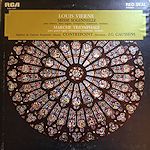 Louis
VIERNE (1870-1937)
Louis
VIERNE (1870-1937)
Mass in C-sharp minor
Marche Triomphale
Ave verum
Two Pieces for Organ
M. Lagache (organ); M. Guyard (organ); Brass septet;
Ensemble Contrepoint; J. G. Gaussens (conductor).
Recorded in 1970 at the Church of St. Merry, Paris.
RCA 644 557
This LP was released on French RCA for the Vierne Centennial in 1970.
I do not believe it has been seen since. What makes it special is
the perfect combination of music, venue and performance. Vierne has
rarely, if ever, been so well presented.
Margarida Mota-Bull
 Gioacchino ROSSINI (1792-1868)
Gioacchino ROSSINI (1792-1868)
Matilde di Shabran (1821-22)
Annick Massis, Juan Diego Flórez; Prague Chamber
Choir; Orquestra Sinfónica de Galicia / Riccardo Frizza; rec. live
August 2004, Rossini Opera Festival, Pesaro, Italy
DECCA 475
7688 [3 CDs: 68.23+52.56+67.36]
This is the role (Corradino) that made Juan Diego
Flórez famous at the age of 23 when in 1996
at the Rossini Opera Festival, in Pesaro, he had to replace the scheduled
Bruce Ford at the last minute. In this recording he reprises the part
and gives a stunning performance. He was at the peak of his powers
when the CD was recorded and this is a rarely heard or staged work
by Rossini. Bel Canto at its very best.
Read
Robert J. Farr’s MusicWeb review here of the CD.
Seen &
Heard review of the
Pesaro and Royal Opera House production of this work
Editor’s Note: The CDs are not
currently available but digital downloads are. It is also available
for streaming via the Naxos site.
 Antônio
Carlos GOMES (1836-1896)
Antônio
Carlos GOMES (1836-1896)
Il
Guarany (1870)
Plácido Domingo, Verónica Villarroel,
Carlos Álvarez; Chor & Extrachor
der Oper der Stadt Bonn; Orchester
der Beethovenhalle Bonn / John Neschling;
rec. live June 1994, Oper der Stadt Bonn, Germany –
SONY CLASSICAL 88985334982
This is a work close to my heart because
I love and studied the novel O Guarani by Brazilian author
José de Alencar
on which it is based. Additionally, Gomes has been largely forgotten
(to my mind unjustly) outside of his home country of Brazil, but he
was a celebrated composer in his day, admired even by none less than
Giuseppe Verdi. Gomes’s music has dramatic power and the score of
Il Guarany is full of beautiful and
memorable moments. This recording is a very good one and deserves
to be listened to again and again.
Editor’s Note: The CDs are not
currently available but digital downloads, including the booklet are.
It is also available for streaming via the Naxos site.

Gaetano DONIZETTI (1797-1848)
Dom Sébastien, roi de Portugal (1837)
Vesselina Kasarova, Giuseppe Filianoti, Alastair
Miles, Simon
Keenlyside, Carmelo Corrado
Caruso;
Orchestra and Chorus of the Royal Opera House Covent Garden / Mark
Elder;
rec. Royal Opera House, London, 10, 13 September 2005;
Ballet Music: 11 September 2005, Cadogan Hall, London.
OPERA RARA ORC33 [3 CDs: 61.56 + 69.58 + 44.36]
The singing is not all first class but this is a rarely presented
work by Donizetti and worthy of having a detailed look at. Being Portuguese
and very interested in history in general and of Portugal in particular,
I was appalled at the complete lack of historical fact in the libretto
(though it deals with real historical figures). However, most people
will not know the history anyway and there is much to enjoy in Donizetti’s
music.
Read
Robert J. Farr’s MusicWeb review here of the CDs.
Seen
and Heard review of the live concert
performance.
Editor’s
Note: These CDs are no longer currently available.
The recording is available for digital download.
Richard Masters

Erich Wolfgang KORNGOLD –
Much Ado About Nothing -Suite
Toscha Seidlel (violin)
"Complete RCA Victor Recordings 1938-1941"
From: Ten More Great Violinists of the Twentieth CenturySalvatore
Accardo, Adolf Busch, Zino Francescatti, Bronislaw Huberman, Ginette
Neveu, Ruggiero Ricci, Aaron Rosand, Wolfgang Schneiderhan, Toscha
Seidel, Oscar Shumsky
BIDDULPH
LAB8102 (10 CDs)

 Alfred
CELLIER (1844-1891)
Alfred
CELLIER (1844-1891)

 All Nimbus reviews
All Nimbus reviews








